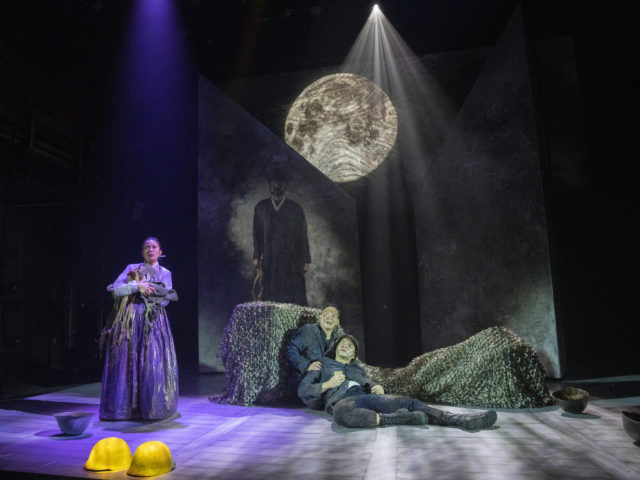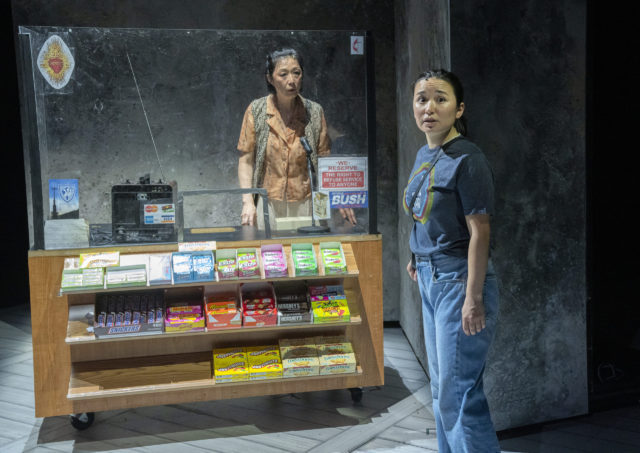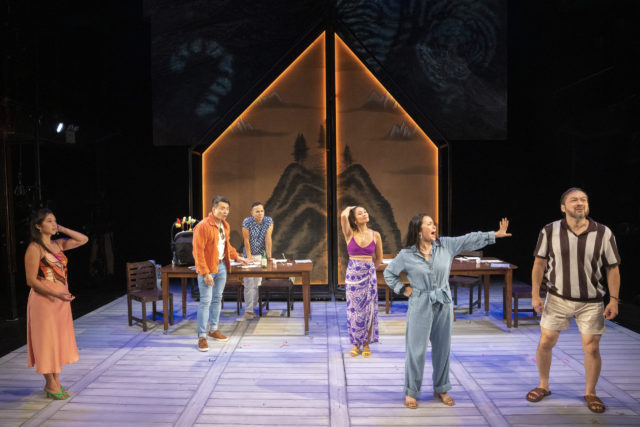
Once Upon a (korean) Time offers a remarkable theatrical experience at La MaMa (photo by Richard Termine)
ONCE UPON A (korean) TIME
La MaMa Experimental Theatre Club
The Ellen Stewart Theatre
66 East Fourth St. between Second Ave. & Bowery
Tuesday – Sunday through September 18, $60-$80
212-475-7710
ma-yitheatre.org
www.lamama.org
“Fairy and folk tale tropes offer modern authors . . . ideal frameworks and well-known terms of reference through which to explore the meanings and mythologies of war, both real and imagined. They do so for children and adults alike,” editors Sara Buttsworth and Maartje Abbenhuis write in the introduction to their 2016 book, War, Myths, and Fairy Tales (Palgrave Macmillan). Playwright and actor Daniel K. Isaac and director Ralph B. Peña take that approach to the next level in Ma-Yi Theater Company’s explosive yet intimate Once Upon a (korean) Time, running at La MaMa through September 18.
The ninety-five-minute show was inspired by Isaac’s biological family as well as his chosen family — in a moving program note he explains, “I am an only child of a Korean immigrant single parent [who fled south during the Korean War]. I do not know my biological father or his side of the family or their history. My maternal grandparents passed before I was born. . . . I have been disowned multiple times for being gay. . . . So the notion of ‘family’ is complicated for me.”
The notion of family is central to the play, which unfurls across a series of interrelated vignettes in which different kinds of battles provide opportunities to tell Korean folk tales as both distraction and metaphor in the midst of heated conflict. The first chapter, “Earth,” takes place in a trench in the 1930s, where two soldiers are under brutal attack. “We gotta get outta here / How do we get outta here / Should we make a run for it / Let’s make a run for it / I don’t wanna die / I’m too young to die / I don’t wanna be here / Get me out of here get me out of here get me out,” one of the soldiers cries out. He demands that the other soldier retell him the legend of brothers Heung-bu and Nol-bu: After their parents die, one sibling inherits everything and banishes the other and his pregnant wife and child. But a single seed from a previously injured baby jeh-bee (swallow) results in magic calabashes that just might right the wrongs.

Two women (Sonnie Brown and Jillian Sun) meet during the 1992 LA riots in Once Upon a (korean) Time (photo by Richard Termine)
The scene is brilliantly directed by Peña on Se Hyun Oh’s bold set, which is highlighted by two massive vertical boulders that rotate throughout the play to form a variety of walls, blockades, caves, and other barriers. As the soldiers hide behind rocks, bullets fly past and bombs explode ever closer; the audience is seated on the same side of the trench as the soldiers, immersing everyone in the dire situation. Oliver Wason’s lighting and Fabian Obispo’s sound, along with projections by Yee Eun Nam and Phuong Nguyen’s costumes, make us feel like we are all in harm’s way. It’s about as powerful an opening scene as I’ve experienced in a long time.
The involving depiction of the horrors of war continues with “Water,” set in a WWII comfort station where three Korean women, one a virgin, are being sexually, physically, and psychologically abused by viciously hostile Japanese soldiers. To distract the virgin from what is soon to happen to her, the other two women share the story of Shim-Cheong, a woman who sacrifices herself in order to save the life of her blind father.
A through line begins to develop as the action moves to a cave during the Korean War (“Heaven”) where the story of the Tiger and the Bear is told, a convenience store (“Fire”) amid the 1992 LA riots supplemented with the tale of the Grandma and the Tiger, and a contemporary gathering where three couples meet at a Korean BBQ restaurant and put it all in context as they await the future.
The stories within the stories offer compelling Korean myths to accompany the central narrative, especially since the outstanding cast goes back and forth between portraying the mythological figures and the “real” characters, sometimes as plays within the play. In “Water,” for example, one of the comfort women tells the virgin that she will be Shim-Cheong, then lays out the plot, gives her her motivation, and even makes a key alteration to her costume.

A Korean BBQ restaurant is the setting for the poignant conclusion of Daniel K. Isaac play (photo by Richard Termine)
Obie-winning Ma-Yi founding member and producing artistic director Peña and Isaac, who previously worked together on Lloyd Suh’s The Chinese Lady — Isaac is best known as an actor, appearing in numerous plays as well as in Billions and other television shows and films and will next be seen in You Will Get Sick at Roundabout next month — also zeroes in on the ideas of legacy, tradition, and belonging, from defending one’s homeland to emigrating overseas. As soon as the young woman walks into the convenience store, the older woman says, “I telling you story.” The young woman asks, “Like once upon a time?” The older woman replies, “No / That American thing.”
At the BBQ restaurant, the six people discuss such fairy tales as Cinderella and Beauty and the Beast as well as their family histories. “Korean stories are so funny,” Jon says. “And usually way more gruesome,” Sasha adds.
Once Upon a (korean) Time is both funny and gruesome, an expertly told tale that excites the eyes and the ears and keeps the heart pumping. There are no lags; something is always happening onstage, and constant movement and projections keep the audience entranced. The seven actors are extraordinary, with Sonnie Brown, Sasha Diamond, David Lee Huynh, Teresa Avia Lim, Jon Norman Schneider, David Shih, and Jillian Sun playing multiple roles. A jubilant scene in which the Sea Dragon bursts into a musical number could have felt out of place but instead is a welcome break from all the solemnity, even as he eagerly declares, “I hear we have a virgin in the house!”
Once Upon a (korean) Time is a gripping, all-too-real story of intergenerational trauma. Peña has called it “insane,” and insane it is, in only the best way. Isaac has dedicated the play to his mother, who will not be able to see it because she refuses to get vaccinated. And that’s a genuine shame, because her son has given the rest of us a remarkable theatrical experience.